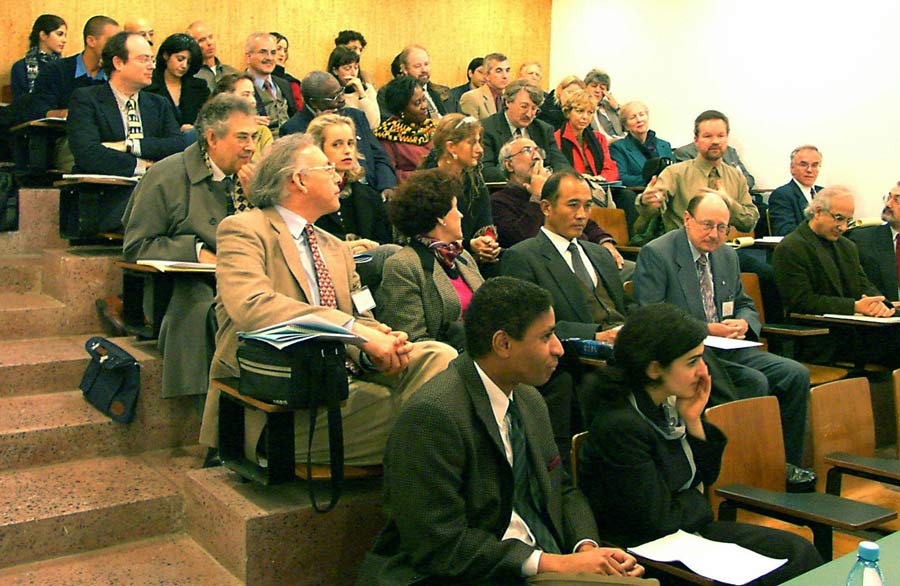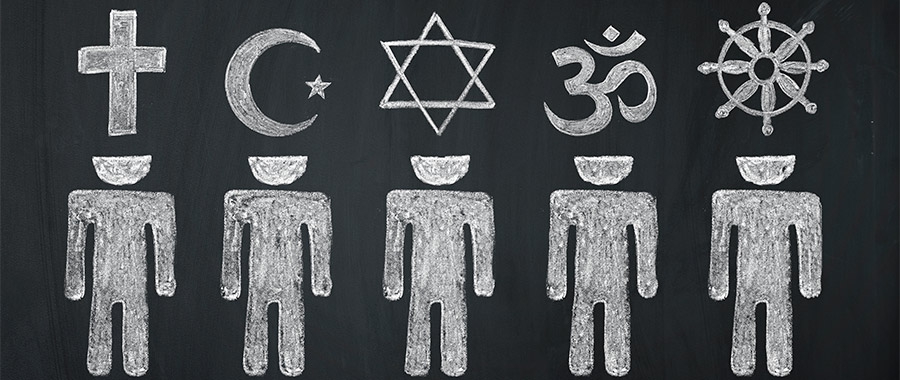The views expressed in our content reflect individual perspectives and do not represent the authoritative views of the Baha'i Faith.
In July of 1947, Shoghi Effendi, in his capacity as the Guardian of the Baha’i Faith, wrote “The Faith of Baha’u’llah: A World Religion” – a summary of the origin, teachings and institutions of the Baha’i Faith.
He prepared this seminal document for the United Nations Special Committee on Palestine (UNSCOP). At the time, that important United Nations committee had begun to survey the causes of the ongoing conflict between Arabs and Jews in Palestine, attempting to devise peaceful solutions. One of UNSCOP’s areas of interest – religion – meant that the committee sought information from all of the Faiths whose shrines and holy places existed in Palestine, long known as the Holy Land.
The Baha’i summary says, in part, that:
… this Faith is now increasingly demonstrating its right to be recognized … as a restatement of the eternal verities underlying all the religions of the past, as a unifying force instilling into the adherents of these religions a new spiritual vigor, infusing them with a new hope and love for mankind, firing them with a new vision of the fundamental unity of their religious doctrines, and unfolding to their eyes the glorious destiny that awaits the human race. – Shoghi Effendi, The Faith of Baha’u’llah: A World Religion.
UNSCOP, as we all know, did not succeed in quelling the religious conflicts in the Middle East, which still exist today. However, the Baha’i message of “the fundamental unity of their religious doctrines” continues to advance Baha’u’llah’s central teaching of the essential oneness of the world’s Faiths, pointing the world and its religions toward what some now call a “transreligious” future.
In his new book, The Ocean of God: On the Transreligious Future of Religions, Baha’i philosopher Roland Faber “conveys the proposition that the future of religions, if they will not want to contribute to the destruction of humanity, will become transreligious.”
What does that mean? The term “transreligious” refers to adopting a broader religious identity beyond calling oneself a Christian, Muslim, Baha’i, etc. – such that one can have both a specific faith-identity, and an overarching sense of being one of God’s children, who come from all faiths, and from none. Being transreligious implies the acceptance of the core message of all religions: love, kindness and unity.
Along those same lines, in the current issue of the Journal of Ecumenical Studies, I contributed a paper entitled, “Baha’i Contributions to Interfaith Relations”. The article offers my individual Baha’i perspective, not an official Baha’i position, which I am not empowered to make. With this disclaimer in mind, here is a brief excerpt:
Today, societies the world over are increasingly multicultural and multifaith in their demographic makeup. Disavowing any inherent sense of superiority or triumphalism, a Baha’i perspective on religious pluralism is readily seen in this call by Baha’u’llah:
… consort with the followers of all religions in a spirit of friendliness and fellowship, to proclaim that which the Speaker on Sinai hath set forth and to observe fairness in all matters.
They that are endued with sincerity and faithfulness should associate with all the peoples and kindreds of the earth with joy and radiance, inasmuch as consorting with people hath promoted and will continue to promote unity and concord, which in turn are conducive to the maintenance of order in the world and to the regeneration of nations. Blessed are such as hold fast to the cord of kindliness and tender mercy and are free from animosity and hatred. – Baha’u’llah, Tablets of Baha’u’llah, pp. 35–36.
This moral imperative can be further developed doctrinally in terms of interfaith relations, from my Baha’i perspective. Shoghi Effendi (1897–1957 — who led the Baha’i world as Guardian of the Baha’i Faith from 1921 to 1957 — wrote the following statement regarding the Baha’i perspective on purpose with regard to the other religions of the world:
Let no one, however, mistake my purpose. The Revelation, of which Baha’u’llah is the source and center, abrogates none of the religions that have preceded it, nor does it attempt, in the slightest degree, to distort their features or to belittle their value. It disclaims any intention of dwarfing any of the Prophets of the past, or of whittling down the eternal verity of their teachings. It can, in no wise, conflict with the spirit that animates their claims, nor does it seek to undermine the basis of any man’s allegiance to their cause. Its declared, its primary purpose is to enable every adherent of these Faiths to obtain a fuller understanding of the religion with which he stands identified, and to acquire a clearer apprehension of its purpose. It is neither eclectic in the presentation of its truths, nor arrogant in the affirmation of its claims. Its teachings revolve around the fundamental principle that religious truth is not absolute but relative, that Divine Revelation is progressive, not final. Unequivocally and without the least reservation it proclaims all established religions to be divine in origin, identical in their aims, complementary in their functions, continuous in their purpose, indispensable in their value to mankind. – Shoghi Effendi, The World Order of Baha’u’llah, pp. 57–58.
Taking each of the “established religions,” one by one, a Baha’i “theology of pluralism” or “theology of religions” is capable of further specificity and application, on a religion-by-religion basis. One way to accomplish this is to substitute a particular religion as one of the “established religions” and to see how Shoghi Effendi’s significant statement may be applied practically to bilateral interfaith relations. Taking Christianity as an example, the following Baha’i perspective on Christianity follows, by means of the following paraphrase of Shoghi Effendi’s pronouncement:
Unequivocally and without the least reservation, it [the Baha’i Faith] proclaims [Christianity] to be divine in origin, identical in [its] aims, complementary in [its] functions, continuous in [its] purpose, indispensable in [its] value to humankind.
This approach has yet to be widely experimented with, much less adopted, yet it is worthy of testing in the social laboratory of interfaith relations in which a Bahá’í presence is included. Whether or not interfaith representatives of Christianity would be prepared to offer reciprocal recognition along these lines remains to be seen. This short declaration of interfaith recognition has tremendous potential as a foundation for more extensive interfaith encounter, engagement, and ecumenism. This formula conceivably could take on a life of its own and represent recognition and reciprocity between any two faith communities in an interfaith context in which a Baha’i representative is at one end of the dialogue. If so, this would represent a distinctively Baha’i contribution to interfaith dialogue and accord at the level of reciprocal recognition and declarations of common cause and shared values at the level of principle. – “Baha’i Contributions To Interfaith Relations,” pp. 273–275.
I’ll recount a brief anecdote on the potential power of this new Baha’i “theology of pluralism” to unify — by my making explicit what Shoghi Effendi first made implicit.
The first and only time I ever visited Jerusalem was in December, 2000. There, I presented a paper at the Hebrew University of Jerusalem at an international academic conference. Since most of the audience, apparently, were Jewish professors and graduate students, I decided to open by offering a Baha’i perspective on Judaism. So I simply took the last sentence in Shoghi Effendi’s passage above, and substituted the word “Judaism”:
Unequivocally and without the least reservation it [the Baha’i Faith] proclaims [Judaism] to be divine in origin, identical in [its] aims, complementary in [its] functions, continuous in [its] purpose, indispensable in [its] value to mankind. – “Why Did God Allow the Holocaust? (Wrong Question).”
Before formally presenting my paper, “The Eschatology of Globalization: Baha’u’llah’s Multiple-Messiahship Revisited” at the Hebrew University of Jerusalem, I told my audience that I’d like to first offer a Baha’i perspective on Judaism. Then I recited the above. After that, I presented a brief list of “33 Baha’i Principles of Unity.”

Baha’i Chair at Hebrew University hosts conference on modern religions. Participants in a session on “Contemporary Meeting of Ultimate Differences” at the conference on modern religions held at the Hebrew University in Jerusalem on 17-21 December 2000. [Note: In this photo, Christopher Buck is speaking. Dr. Buck is seated in the row directly behind Dr. Nader Saiedi, who is now the Taslimi Foundation Professor of Baha’i Studies in the department of Near Eastern Languages and Cultures at UCLA.]
“I believe everything you just said! So my question to you is this: Can I become a Baha’i, and also remain Jewish? Or do I have to leave Judaism to become a Baha’i?”
Initially unsure how to answer, I thought for a moment, and then replied: “Both!”
Therein lies the strength of the unity of the [Baha’i] Faith, of the validity of a Revelation that claims not to destroy or belittle previous Revelations, but to connect, unify, and fulfill them. – Shoghi Effendi, The World Order of Baha’u’llah, p. 22.
This is like being an American, and at the same time identifying oneself as a world citizen — adopting a wider, more inclusive loyalty. Here, a “transreligious” identity basically means that we see ourselves as a global religious citizen.
















Comments
Sign in or create an account
Continue with Googleor